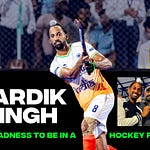In this episode of Studio Hockey, the hosts are happy to bring on Zach Wallace, a dynamic, attacking midfielder /striker. Wallace has donned both the England and Great Britain shirts, with experience at the highest level, including the Tokyo and Paris Olympics. He is recognized not just for his on-field acumen but for his willingness to embrace new challenges, notably through his stints in the Dutch Hoofdklasse with HGC and now Bloemendaal and the revitalized Hockey India League (HIL). Wallace brings a refreshing perspective shaped by experiences across continents.
Joining the Revival of the Hockey India League
Ernst Baart opens the conversation by referencing Wallace’s participation in the Hockey India League—a new experience for Zach, whose age meant he missed the first incarnation of the HIL. Ernst asks about his first impressions and what it was like to perform in front of the passionate Indian crowd.
Wallace explains that entering the HIL came with a heap of unknowns: unclear auctions, team selections, coaching staff, and logistical puzzles.
“There was a lot of unknowns,” he recalls, “so for me anyway, I just sort of went into it open-minded, not really expecting too much."
Wallace, however, found the experience went beyond anything he anticipated.
“To be honest with you, it completely surpassed my expectations… For me, I had an amazing month, five weeks, whatever it was out there. And yeah, great experience."
Personal and Professional Takeaways from India
Ernst then dives deeper, asking not just what Zach learned as a player, but as a human being in India.
Wallace thoughtfully reflects on the mutual lessons exchanged: although the HIL markets itself as a learning ground for Indian players via imported expertise, he feels the privilege of playing in such a context goes both ways.
“On reflection, when you come away from it, you think… I think in reality, they teach you so much more about almost what a privilege it is to play hockey, what a privilege it is to be on that stage.”
Listening to his Indian teammates’ life stories was humbling and grounding for him. “It makes you recognize just what an honor it is to play international hockey.”
Would HIL Benefit from Traveling again?
Jaspreet interjects to ask about the new HIL format, which held all its matches in one city, Rourkela, and whether Wallace would prefer a touring model with matches in multiple cities.
Wallace is candid: “In short, yes.” While understanding the logistical appeal of one location for a revival season, he longs for the variety and fresh energy that come from traveling.
“I mean, it would be cool to see all different parts of India, to play in front of different crowds, different stadiums, give the opportunity to more people.” He adds, “After a while, you get the same people returning to games and the stadiums maybe fell a little bit flat.”
Seeking Opportunities Abroad: Why Leave England?
Jaspreet turns to Wallace’s experience of playing outside England, drawing on Zach’s time in both India and the Netherlands. He asks what has driven Wallace to seek opportunities abroad.
Zach traces his motivations back to youthful ambition:
“The Dutch league has always been the best league or known as the best league.”
He wanted consistent, high-level games that the English league couldn’t offer. What started as a one-year experiment became an extended stay because, as Wallace quips, “Here I am five years later or four years later, whatever it is, still stuck out in Holland because, yeah, I love it that much.” Ultimately, it was the lure of “challenging myself against the best players,” and the adventure that drew him in.
Personal Growth Through International Experience
Ernst asks what Wallace has learned about himself from moving away from home and immersing himself in different leagues and cultures.
Wallace describes a transformative journey: “I’ve grown up a lot because I left for Holland… as a 20-year-old.” Beyond hockey, he’s had to master life skills like cooking and laundry, build relationships, and adapt to new cultures. He is grateful for the personal development:
“I look back and the opportunities I’ve had because of moving abroad, getting to know new people, it’s hard to think of what my life would have been if I didn’t.”
The Influence of Michel van den Heuvel at Bloemendaal
The discussion shifts to Wallace’s current club, Bloemendaal, and its influential coach Michel van den Heuvel. Ernst asks about the impact of working with such a “character” and tactical mind.
Wallace is full of praise: “He’s an incredible hockey person, incredible hockey coach. He has so much knowledge about the game.” He’s been especially impressed by van den Heuvel’s team-building and program-structuring abilities:
“He gets people into the right positions that they're able to influence the game in the way that they should.” Most powerful, though, is how the coach brings intensity and focus to high-stakes moments: “When it’s a big game, you can really feel it… the sort of tension he brings, the intensity.”
Memories of Olympic Battles: England vs. India
Jaspreet returns the conversation to the emotional Paris Olympic clash between Great Britain and India, a particularly intense and dramatic match in that quarter final where India had to play with 10 for most of the game, because of an early red card, but still managed to win in shoot-outs.
Wallace admits the loss was stinging: “Of course, like, very disappointed after… you think about this whole story that you written, maybe as a team.” Yet, he’s philosophical and sportsmanlike, giving credit to India and goalkeeper Sreejesh: “Sreejesh had an amazing game. India fought for their lives… credit to them as well.”
Transitioning to the European Championships: England’s Prospects
Turning to the forthcoming European Championships in Germany, Jaspreet asks Wallace to assess the England team’s preparations and trajectory.
Wallace acknowledges early turbulence—coaching changes, roster turnover, the impact of players returning from abroad—but feels momentum building: “I can feel a really good energy, a really good vibe in the team as we're going into the championship.” He’s aware of the formidable competition:
“The top five ranked teams in the world in one tournament, that is pretty crazy.”
Predicting the Semi-Finalists: Who Will Emerge?
Jaspreet tests Wallace’s nerve, requesting semi-finalist predictions for the Euros.
Wallace obliges: England (his own team), Belgium, and the Dutch are his favorites, while suggesting Germany may also progress: “I would say us vs Belgium and the Dutch against Germany.” Spain, he feels, have talent but might “just fall short against the experience of Belgium and Holland.”
Ernst notes France’s recent practice win over the Dutch and asks if England is wary of the French and Polish threats in their group.
Wallace is vigilant: “They both have their own threats, both have some decent players that can, if you let them affect a game, they can do that.” He’s intrigued by the new energy a young French coaching staff brings, and notes, “we're very aware that we will have to be at our best to beat them.”
From Podium to Gold: The Final Step for England
With England’s recent near-miss in the European final, Ernst presses Wallace on what needs to change to convert podium finishes into gold.
Wallace underscores the significance of marginal gains:
“It's just really small details. One small moment of switching off... is the difference between winning and losing.”
He highlights the razor-thin margins at the top: “Almost every [Pro League] game is decided by one goal.”
England vs. Great Britain Identity – Confusing or Inspiring?
Ernst brings up the perennial confusion—for fans and players—surrounding whether England (or Scotland/Wales) or Great Britain teams are fielded, and whether this has any real impact.
Wallace acknowledges the complexity but feels it has little impact on the team: “We train as GB all the time, so that doesn’t change… The only difficulty is maybe for the Scottish and Welsh players… they have to train a lot and they don’t almost get the rewards." He advocates for fairness and opportunities for all, saying, “At the end of the day that’s why you do all the hard work and training and put in all the graft.”
Could Europe Run Its Own Franchise League?
Ernst raises the intriguing idea of Europe launching a Hockey India League-style franchise competition, with mixed-nationality teams and a more professional set-up.
Wallace supports innovation but warns about practical limits:
“The difficulty is where, where it fits in the calendar. I mean for us as players, it’s just, it’s one thing into the other… You hardly even get a week off.”
Nonetheless, he’s enthusiastic: “In principle, I love the idea… getting the best players in the world in the competition and making the game more professional.”
The Asia Cup – Can Anyone Challenge India?
Jaspreet shifts focus to the upcoming Asia Cup, asking if any team in Asia is likely to challenge India’s dominance.
Wallace is respectful but forthright: “The way I see it is India are still a level above.” He’s pleased to see countries like Pakistan, Malaysia, and China improving, noting that his own club coach, Michel van den Heuvel, is now with China and will surely raise their level. Nonetheless, Zach maintains,
“I still see India as being a level above the other teams in that Asian competition. So, my expectations is that they win it.”
Life After Hockey: Building a Parallel Career
Ernst closes the interview by asking Wallace about his post-hockey ambitions—what he’s planning for the future and if he’s balancing work alongside his sporting career.
Wallace reveals he is already preparing for life after active competition, currently working as an investment analyst in the Netherlands: “For me, it’s always been really important. I find it a good balance too when I’m working, I don’t really think about hockey, and when I play hockey, I don’t think about work.” He is grateful for the support his company provides, allowing him flexibility to pursue both vocations.
Recap
This episode of Studio Hockey with Zach Wallace offered deep personal and professional insights, tracing the journey of a player who has leveraged the global stage of field hockey for both sporting success and personal growth. From the cultural exchange of the Hockey India League, the tactical intensity of Dutch club hockey, to representing his country at the Olympics and European Championships, Wallace stands as a testament to the modern international hockey player—open-minded, ambitious, and adaptable.
We hope you enjoyed this episode of Studio Hockey, bringing you thoughtful discussion about both international and domestic field hockey. Your hosts Ernst Baart, representing the European perspective, and Jaspreet Singh, bringing the Asian viewpoint, will be back soon with more stories from the world of hockey.
Until next time—happy hockey!















